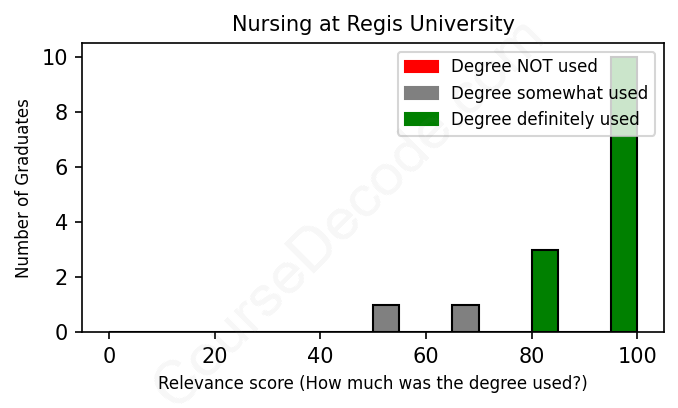
First, some facts. Of the Nursing graduates from Regis University we've analyzed , here's how many have used (or NOT used) their degree in their career:

These are estimates based on AI analysis of 15 LinkedIn profiles (see below).
The verdict? Great! Overall, with an average relevance score of 90%, Nursing graduates from Regis University have a substantially higher likelihood (+23%) of finding work in this field compared to the average graduate across all fields:
And for comparison, here's the chart for all profiles we've looked at across all degrees.
Also, after graduating, only 33% of these graduates have pursued further education other than another Bachelor's degree (such as a Masters degree or other), compared to the average across all profiles of 35%. This suggests a Bachelors degree is enough for most Nursing graduates, and it's normal to look for work straight after graduation.
See the details:
|
Relevance score: 100% We think this person has gone into a career highly relevant to their degree. We think this person has gone into a career highly relevant to their degree.
DEGREE INFOGraduated in 2013 from Regis University with a Bachelor's degree in Nursing. No other secondary education since. JOB HISTORY SINCE GRADUATIONChemotherapy Infusion Nurse Stephenson Cancer Center Apr 2013 - Present ABOUTNo information provided. |
The top 10 most common jobs done by the graduates we've analyzed (ranked most common to least) are:
Many graduates from Regis University with a nursing degree have found themselves in a wide range of roles, but there’s a heavy lean towards clinical positions where nursing skills and knowledge are directly applied. Common roles include Registered Nurses, Case Management Nurses, and Nurse Practitioners, which all require specific nursing competencies and utilize the education they gained during their program. For instance, many have taken on roles in hospitals, clinics, and other healthcare settings where they can provide direct patient care, manage clinical responsibilities, or lead teams, reflecting a clear connection to their nursing background.
While some graduates have branched out into roles like Health Services Administrator or even Electronic Medical Records Consultant, these positions tend to be less relevant to the core nursing education and skills. Interestingly, there are also graduates who have taken on roles that might overlap with healthcare but don’t tap into their nursing training, such as being a Group Fitness Instructor. Overall, though, the majority of these professionals are in jobs that effectively utilize their nursing degrees, highlighting how well their education prepares them for these critical roles in healthcare.
Here is a visual representation of the most common words in job titles for Nursing graduates (this is across all Nursing graduates we've analyzed, not just those who went to Regis University):

It looks like graduates from the Nursing program at Regis University tend to follow a pretty solid career trajectory, especially right after graduation. Many alumni begin their careers as registered nurses, often taking on roles in various healthcare settings such as hospitals, outpatient centers, and specialized clinics. It's common to see them transitioning into different nursing specialties or moving into management and administrative positions within a few years. For instance, many of the early career roles mentioned include critical care nursing, pediatric care, and even roles like charge nurse, which indicate that they are getting good hands-on experience and responsibilities that can lead to more advanced opportunities down the line.
Fast forward five or ten years, and you'll see many of these graduates climbing up the career ladder. They often move into advanced practice roles, such as nurse practitioners and physician assistants, or take on leadership roles like director of nursing or health services administration. While some have even transitioned out of traditional nursing roles into management and consultancy positions, the vast majority remain within the healthcare field. Overall, it seems like the nursing graduates from Regis University are doing well in building careers that not only leverage their education but also allow them to make a meaningful impact in healthcare settings.
Getting a Bachelor’s degree in Nursing can be pretty challenging, and that applies to Regis University too. The coursework is demanding, with a mix of science classes, nursing theory, and hands-on clinical practice. You’ll need to juggle studying for exams, care plans, and, of course, some long shifts in labs or at hospitals. While the university provides a supportive environment, the pace can really ramp up, especially as you dive into patient care scenarios. So, if you’re ready to put in the work and stay committed, you'll find it rewarding, but just know it won’t be a walk in the park!
Most commonly, in the LinkedIn profiles we've looked at, it takes people 2 years to finish a Bachelor degree in Nursing.
Looking at the career paths of these nursing graduates from Regis University, it seems like many of them are doing pretty well financially. A lot have secured stable positions and climbed up the ranks quickly, especially those in roles like Nurse Managers or Directors. Positions in healthcare, especially nursing, generally offer decent salaries, and it looks like most have capitalized on that, with many gaining experience in specialized areas like critical care and pediatrics, which often come with higher pay. While some early roles or gaps might suggest a bit of uncertainty, overall, it seems like a good number of these grads have found ways to make solid money in their careers.
Here is a visual representation of the most common words seen in the "about" section of LinkedIn profiles who have a Bachelor degree in Nursing (this is across all Nursing graduates we've analyzed, not just those who went to Regis University). This may or may not be useful:

Here are all colleges offering a Bachelor degree in Nursing (ordered by the average relevance score of their Nursing graduates, best to worst) where we have analyzed at least 10 of their graduates: